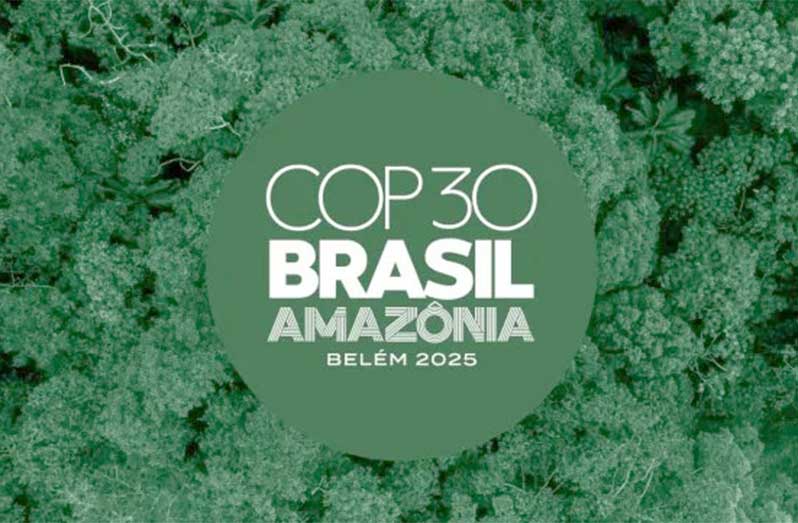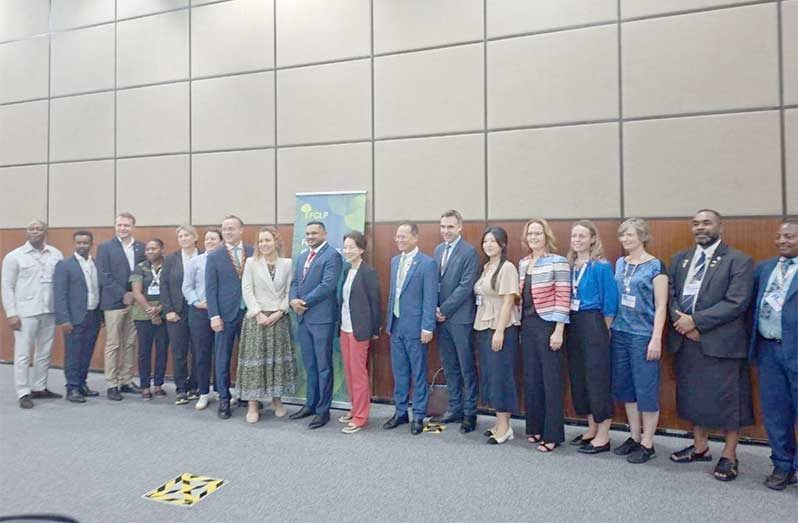GUYANA has urged a shift from plans to actual work on global climate actions, with Minister Vickram Bharrat asking COP30 delegates to address the funding and structural issues that hinder real progress.
The 30th United Nations Climate Change Conference (UNFCCC COP 30) is taking place at Belem, Brazil, from November 10 to 21 this year.
It focuses on accelerating global climate action to limit the increase in the Earth’s average global temperature to 1.5 degrees Celsius above pre-industrial levels (defined as 1850-1900).
It is the first COP held in the Amazon Region, and it also highlights the connections between climate, biodiversity, food systems, and the rights of indigenous peoples and local communities.
Speaking during the high-level segment on Monday, Minister Bharrat praised Brazil’s leadership in steering COP 30 toward practical solutions.
He also referenced President Dr Mohamed Irfaan Ali’s message at the recent World Leaders’ Summit, stating that ‘the world has the ambition and the solutions we need. What is missing is finance and systems to turn ambition into action.’
Minister Bharrat identified three areas where global co-operation must accelerate and bring the COP 30 goals to fruition.
These include energy transition, forest finance, and adaptation and global finance reform.
ENERGY TRANSITION
With global energy demand surging, driven by digitalisation, industrialisation, electrification, and the rapid expansion of artificial intelligence, Minister Bharrat said hundreds of millions of people still lack access to modern energy and many more face chronic instability.
He said the need to transition away from fossil fuels is clear. The challenge, he stressed, lies in how nations make the transition.

“We need an energy transition grounded in carbon science and the principles of a just transition. It must be guided by rules, not rhetoric,” the minister stated.
This means establishing global carbon pricing, phasing out fossil-fuel subsidies and recognising the role of responsible, lower-carbon producers in meeting the demand that will remain even in the most ambitious net-zero scenarios.
FORESTS AND NATURE
Meanwhile, “the second area where global systems need to improve is forests and nature,” Minister Bharrat said. The forests can deliver a third of the climate change mitigation needed by 2030.
The natural resources minister said countries like Brazil have already shown what is possible, while demonstrating that the previous successes in cutting deforestation by 80 per cent and preventing 5 billion tonnes of carbon emissions.
“What is needed now is finance to achieve this level of results across the world,” he told delegates.
Guyana, which co-chairs the Forest and Climate Leaders’ Partnership with the United Kingdom, developed the Forest Finance Roadmap, which sets out six complementary options to make forests worth more alive than dead.
“All six must be scaled together. Two stand out,” he said. The first is the Tropical Forests Forever Facility (TFFF), which Brazil champions.
Minister Bharrat said the initiative is bold and fair, stating that it can provide the long-term, performance-based finance that forest countries have sought for decades.
“But those who championed its creation must follow through with funding,” he emphasised.
“A facility designed to reward forest countries only works if the partners who helped bring it into being ensure it is fully funded and operational at scale.”
The second is the jurisdictional REDD+ (J-REDD+), which is already delivering results.
Jurisdictional REDD+ (J-REDD+) is a government-led initiative to reduce greenhouse gas emissions from deforestation and forest degradation at a national or subnational scale.
The minister noted that this approach maintains one of the world’s lowest deforestation rates while improving the lives of the people.
“We strengthened MRV systems, expanded Indigenous land rights, and integrated early into global carbon markets. Guyana became the first country to issue ART-TREES jurisdictional credits and to access the CORSIA compliance market. To date, we have received well over half a billion US dollars in jurisdictional REDD+ payments,” he explained.
ADAPTATION AND GLOBAL FINANCE REFORM
Adaptation, Minister Bharrat warned, remains a matter of “safety and survival” for millions, yet financing continued to be too limited and too difficult to access.
He said Guyana is demonstrating an integrated approach through its Low Carbon Development Strategy (LCDS).
The LCDS is scaling renewable energy, strengthening climate resilience, expanding sustainable cities, improving food security, investing in biodiversity, and reinvesting forest revenues directly into communities.
“We believe, from our experience, that the solutions are known,” he said, as he challenged nations to confront the financing gaps and reform global systems that slow progress. [DPI]



.jpg)









